
Fat burning matters
Here’s the truth: You didn’t gain those extra pounds overnight, even if that’s the amount of time it took for your favourite jeans to go from comfy to “did I shrink these?”
Every expert ever will tell you that crash diets don’t work, are unhealthy, and offer at best a temporary fix since you may end up gaining back more than you initially lost once you fall off the wagon. But that doesn’t mean losing weight has to be a slow, torturous process either. Yes, you’ll still have to eat few calories than you burn, but nutrition (Make sure you keep these 6 foods in mind if you’re wanting to burn fat fast.) and exercise researchers have uncovered some scientifically tested ways to make that easier and faster than ever.

Good news, bad news
First, the bad news. There’s no such thing as negative-calorie foods and no magic combination of nutrients that will generate enough metabolic burn to widen your thigh gap. Things like caffeine, green tea, and spicy foods do mildly increase your metabolism, but not nearly enough to make a difference on the scale.
“You need a deficit of 500 calories per day to lose one pound a week,” says Stacey Pence, RD, a nutritionist at The Ohio State University Wexner Medical Center. The only way to do that is to eat less or exercise more.
So what’s the good news? There are plenty of things you can do—or avoid doing—that will make it easier to eat less and move more. And that means the pounds will drop off faster than you can imagine. Find out the 6 exercises that will boost your metabolism.
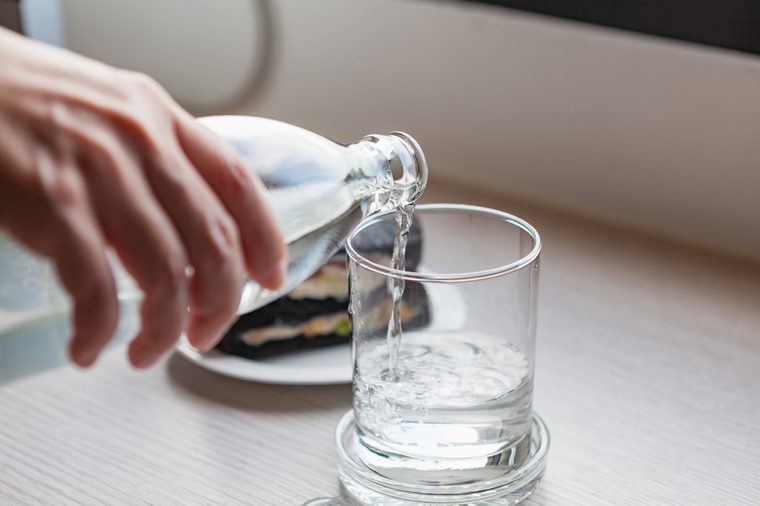
Stay hydrated
Water isn’t just a calorie-free beverage, it’s also essential to the process of metabolizing fat, known as hydrolysis, says Pence. So it’s important to drink enough fluids every day—and you’ll need even more if you’re overweight. A good rule of thumb is to drink a milliliter of water for every calorie you consume. Not into the metric system? If you’re following a 2000-calorie diet, that comes to 67 ounces or just over a half gallon of water. Don’t miss the 17 secret signs you’re dehydrated.
Pence says there’s truth to the idea that thirst is mistaken for hunger. “Your body monitors blood volume and when it notices that you’re dehydrated, it sends out a hunger signal,” she explains. So drinking water and waiting 20 minutes to see if your stomach’s still rumbling is a good tactic.
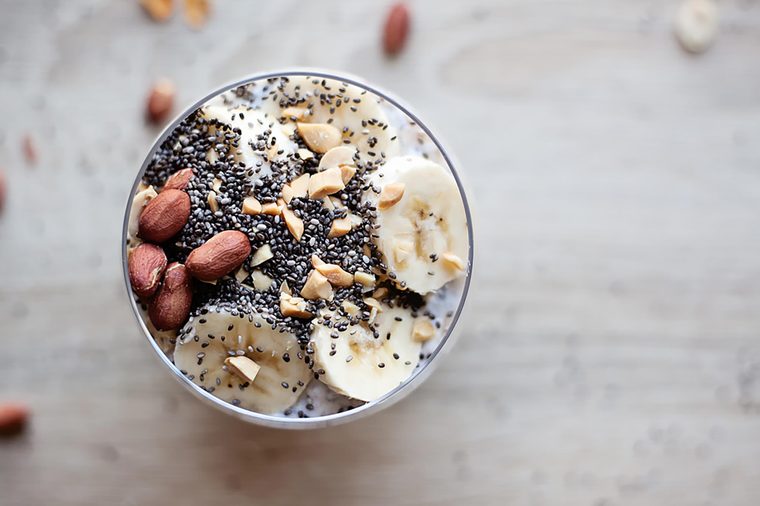
Eat protein at breakfast
When you first wake up, you’ve been fasting all night long. Your body doesn’t have anywhere to get protein other than your muscles, and you don’t want to lose muscle, your most metabolically active tissue (in other words, it burns calories even when you’re not doing a thing).
To prevent that from happening, says Jessica Crandall, RD, a spokesperson for the Academy of Nutrition and Dietetics and personal trainer, aim for between 20 and 30 grams first thing. She likes an egg scramble with veggies, cheese, and black beans or fills to-go coffee cups with a mix of Greek yogurt, chia seeds, nuts, and berries.
Love yoga? Here are 6 moves for weight loss.
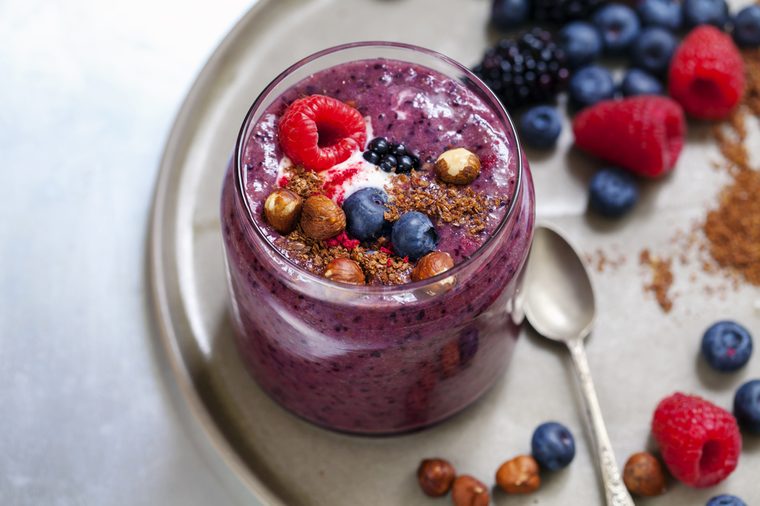
And all day long
Studies have found that the more lean protein in your diet, the lower your risk of belly fat. One possible explanation: Protein takes longer to digest than quick-burning carbohydrates, but is less calorie-dense than fat. Which means it will keep you full longer on fewer calories.
Protein is also key in building metabolically active muscle, which helps keep your metabolism active. Having chicken for dinner? Try making this marinade to give your protein some zest.
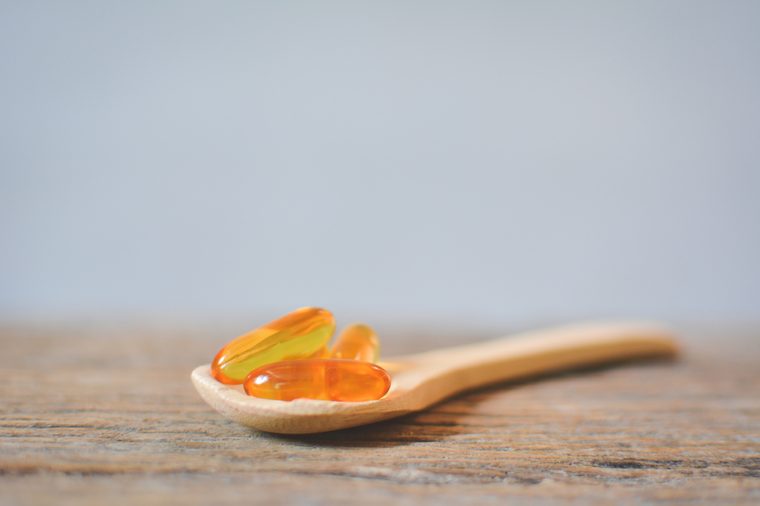
Take a multivitamin
When you’re cutting calories, it can be tough to make sure you’re still getting enough of all the good stuff your body runs on. “Nutrient deficiencies can stall or halt weight loss,” says Crandall. She sees lots of patients with low levels of vitamin D, for example, a nutrient that is critical to parathyroid hormone function—it helps with weight regulation. (This vitamin could be the answer to preventing this degenerative disease.) If you’re not eating a well-balanced diet, a multivitamin can be a good way to bridge those nutritional gaps and make sure you’re not missing anything that could impede weight loss or muscle building, such as calcium or iron.
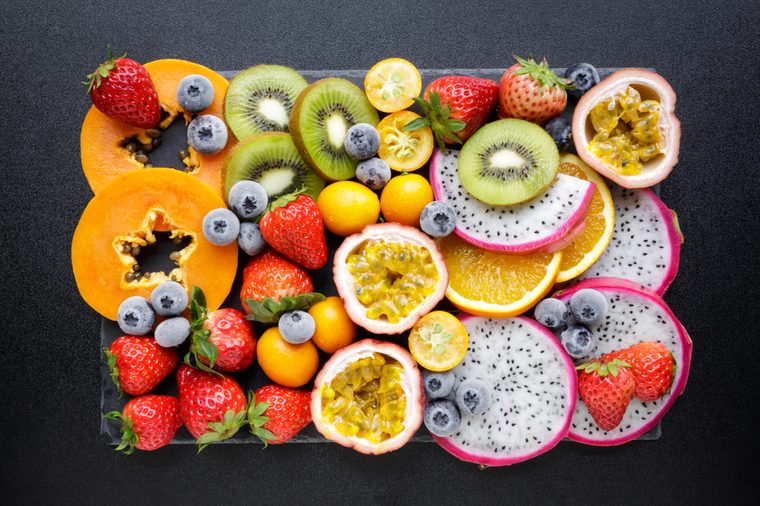
Boost your fiber intake
“Most Americans are averaging 16 grams a day. The goal is between 25 and 30, says Crandall. Here’s why you may want to take that challenge seriously: Studies have consistently shown that the more fibre you eat, the less you tend to weigh.
Fibre—both soluble and insoluble kinds—tends to fill you up so you don’t eat as much, and is prevalent in lower-calorie foods like fruits and vegetables. Though not all of them, Crandall cautions. “Lettuce does not have a ton of fibre” so you can’t get by on salad alone. She recommends adding one cup of fruit or vegetables to every meal or snack to meet your quota. Or energize your morning with this fibre-packed green smoothie recipe.
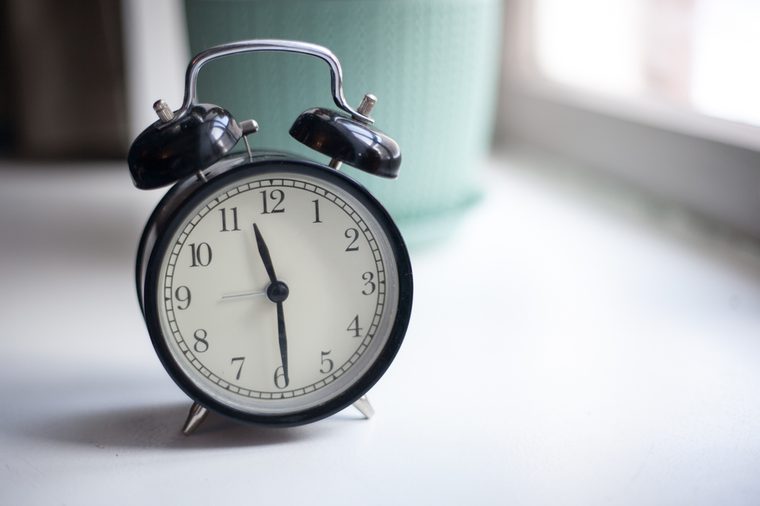
Eat more frequently
Spreading the same amount of calories out over the course of your day (so that you’re eating within an hour of waking up and then every four to six hours) will jumpstart your metabolism, kicking off your calorie burn, and keep it going at a steady pace all day long, Crandall says. This works for a lot of people by keeping blood sugar levels steady, preventing the surges and plunges that can lead to ravenous hunger and overeating. It also keeps you from feeling deprived. These 20 foods are never worth the calories.
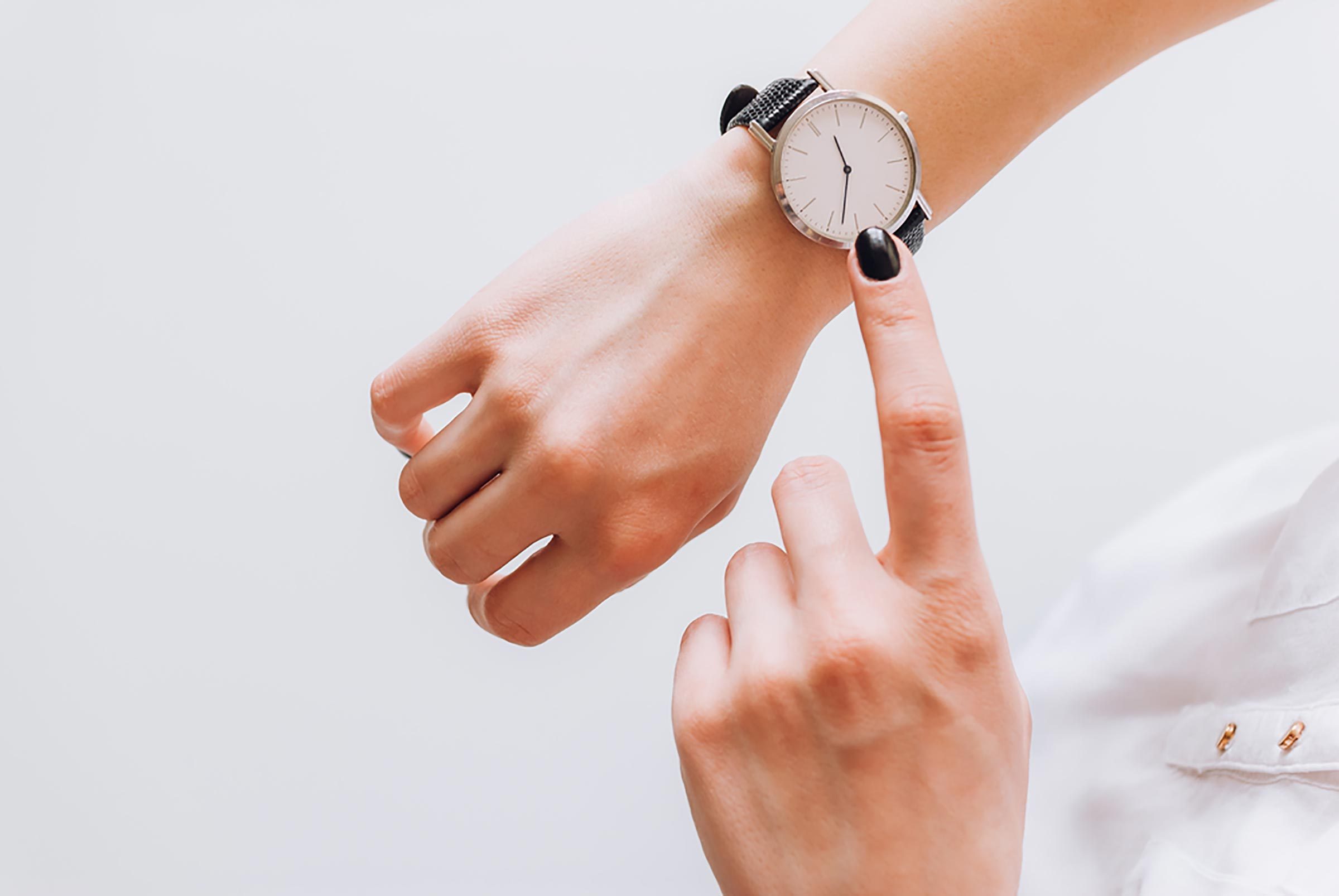
And stop eating earlier in the day
Nighttime snacking may be even worse than we thought. When researchers fed rats the same amount of calories but varied whether they ate them over an eight to ten-hour period or a 15 to 24-hour span, the late night diners became obese while the rats who noshed only during the day lost weight.
While they haven’t identified exactly why this occurred, they believe it has something to do with eating in line with circadian rhythms, or our bodies’ natural internal clocks, which can be triggered by environmental conditions such as sunlight. When researchers repeated the study with humans they got similar results—seems like a good idea to quit eating at sundown.
Have you tried mindful eating? Here’s how it can help you lose weight.
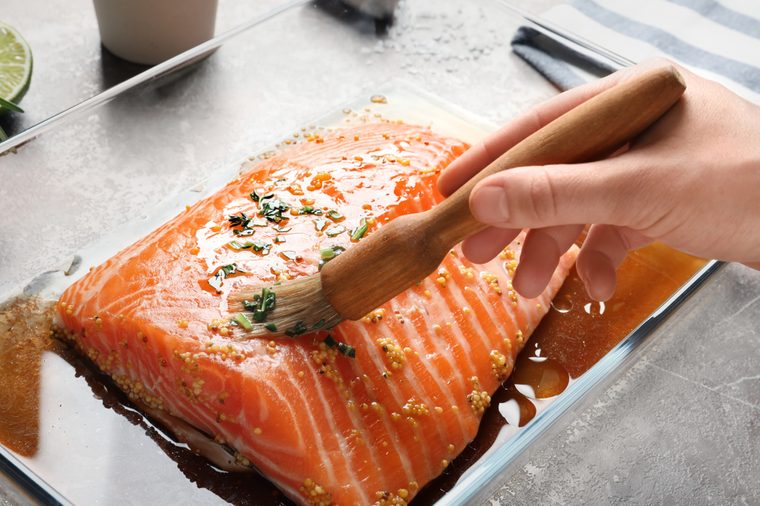
Get your omega-3s
These fatty acids rocketed to fame for their ability to decrease the harmful inflammation that is associated with many chronic diseases—including obesity. Crandall is quick to point out that researchers have yet to find a cause-and-effect link—so don’t expect to pop a fish oil supplement, for example, and drop 10 pounds. But, she says, getting omega-3s from whole foods such as nuts, seeds, and fatty fish like salmon is a good way to hedge your bets. And bonus: If you’re suffering from other kinds of inflammation, that can lessen your willingness to be active, omega-3s might help there, too.
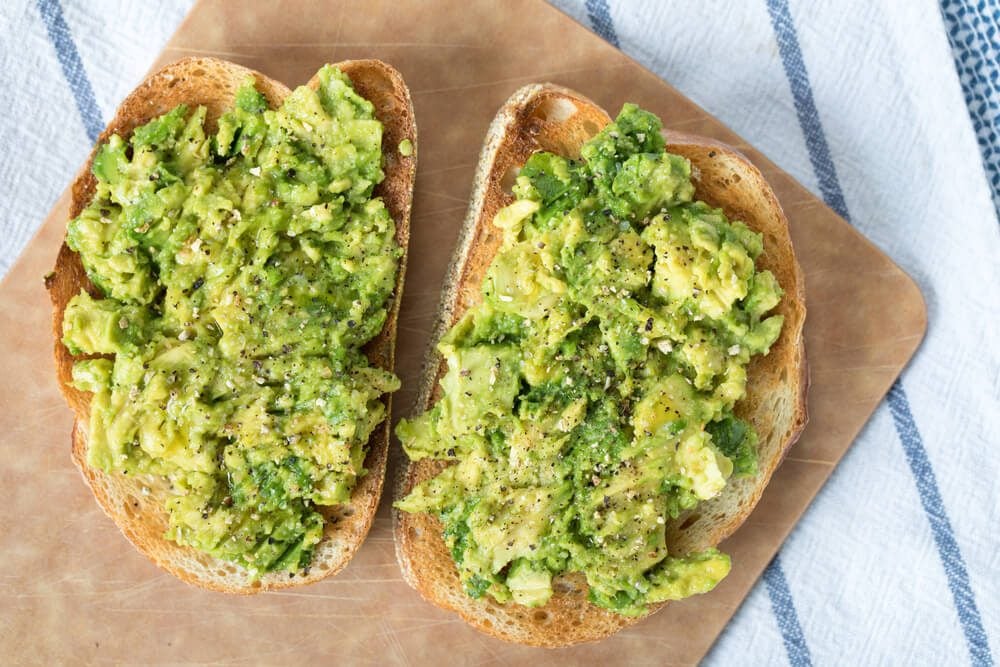
Get some fat at breakfast
Fat gets a bad rap because it’s more calorie-dense than other nutients—nine calories a gram compared to four for protein and carbs. But emerging research indicates that healthy fats can help you feel full and stay that way; that means you’ll eat less throughout the day.
A recent study in the journal Nature found that mice who were fed a breakfast in which 45 percent of the calories came from fat tended to burn more body fat over the next 24 hours than those who ate a meal that was only 20 percent fat. This is early research—it needs to be repeated for humans—but mono and polyunsaturated fats like those found in avocados and nuts do have plenty of health benefits when you eat them in moderation. Now sure what breakfast choices are right for you? Here’s how you choose the best foods to fuel your morning.
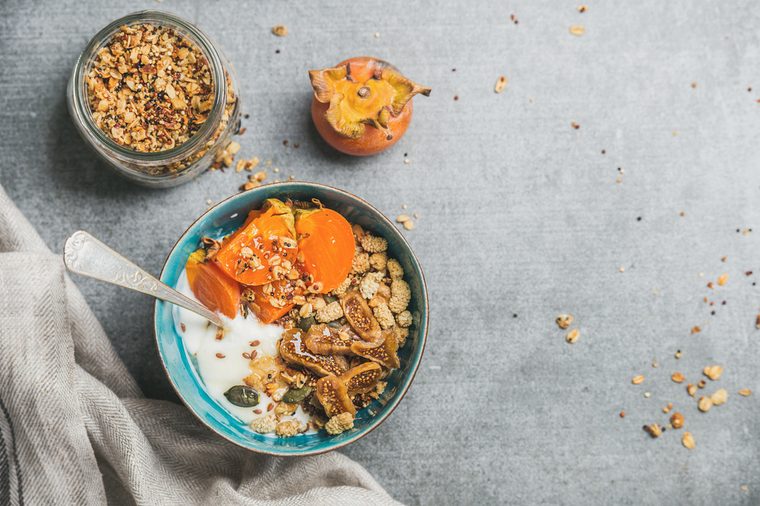
Have some probiotics
A healthy gastrointestinal tract is teeming with beneficial bacteria, and scientists are uncovering just how important those microbes are for keeping your weight under control. They’ve discovered that the strains of bacteria in the guts of thin people differ from those in obese folks, and there’s evidence that certain types of probiotics may help aid weight loss by assisting with the regulation of appetite, fat storage, and other related metabolic functions. You can get probiotics from live culture yogurt and certain supplements. While popping a pill or eating yogurt won’t magically shrink your waist, warns Ginger Hultin, RD, gut health is important. Read more about the best probiotics for weight loss.

Cut back on alcohol
We call it a beer gut for a reason: Your body tends to prioritize getting rid of any alcohol in your system, so it targets those calories first, which may impede fat burning, explains Hultin. Alcohol also tends to be higher in calories (7 per gram), and its inhibition-dissolving tendencies may lead you to overeat. Lose the booze, and you’ll likely lose more weight, too.
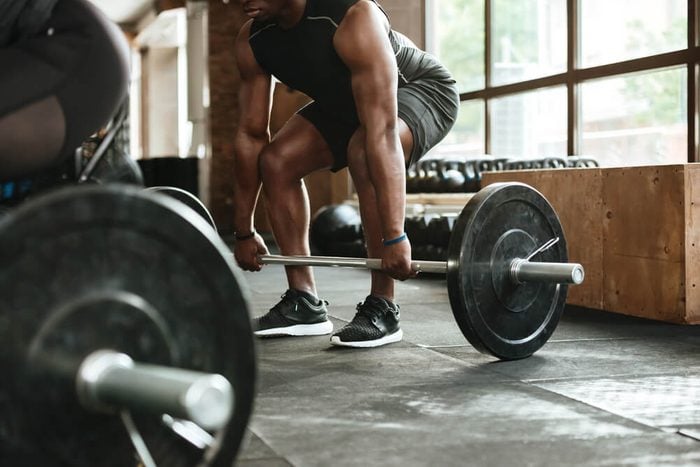
Strength train
Most people think of cardio as a weight loss all-star, but you don’t need to spend all day on the treadmill to slim down. In fact, you might want to concentrate your efforts in the weight room. Muscle is metabolically active tissue, which means that it burns calories even when you’re not lifting; your body burns calories just to maintain muscle, so the more of it you have, the more calories you torch. You lose muscle mass naturally as you age, a process known as sarcopenia, which is why losing weight tends to get tougher the older you get. One study found that just ten weeks of resistance training increased resting metabolic rate (the number of calories your body burns when you’re not doing anything) by seven percent. Check out this beginner’s guide to strength training.
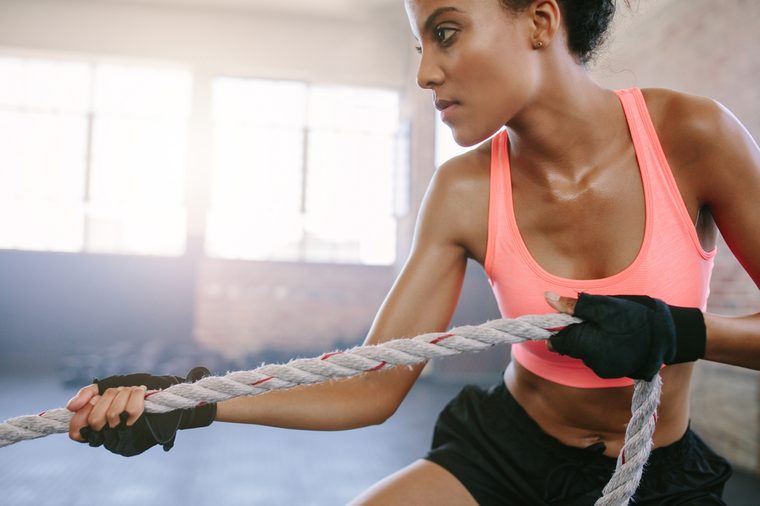
Spend less time at the gym
High-intensity interval training—HIIT—has gained a reputation as an efficient way to get fast results. This workout involves short (30 seconds to five minutes), vigorous bursts of activity interspersed with periods of rest for maximum results. Incorporating HIIT into your strength training may offer even more results, according to a recent study by the American Council on Exercise—the results suggest the combo may be even more effective in burning fat fast.
Don’t miss the real reason why you should add HIIT to your workout routine.

Get enough zzzs
“Poor sleep quality or quantity can make it difficult to lose or even maintain your weight,” says Darria Long Gillespie, MD, a clinical assistant professor of emergency medicine at The University of Tennessee. When you are sleep deprived, your body becomes less sensitive to the effects of leptin, the hormone that usually signals that you’ve had enough to eat. At the same time, the amount of the hunger hormone, ghrelin, increases, so you want to eat more. Together, it’s a recipe for overeating.
On average, Gillespie says, people need seven to nine hours of shuteye a night. If you’re getting consistently less than that, you could be suffering the effects of sleep deprivation. Here’s the exact amount of sleep you need to burn fat fast.

Don’t sleep like a baby
Sleep quality matters as much as quantity, according to Gillespie. In general, an uninterrupted seven hours is better than 12 hours of tossing and turning. Of course, for new moms or others for whom sleep is hard to come by, naps are better than nothing. But if it’s possible to get your nightly sleep done in a solid block, that’s your best bet, she says.
Good sleep hygiene can help. “Our ancestors needed to sleep when it was dark, quiet, and cool, Gillespie says. “That meant it was safe.” Despite technological advancements like heat and air conditioning, our bodies still crave those cave-like conditions. Draw the blinds, use a white noise generator, and keep the thermostat set between 63 and 68 degrees.
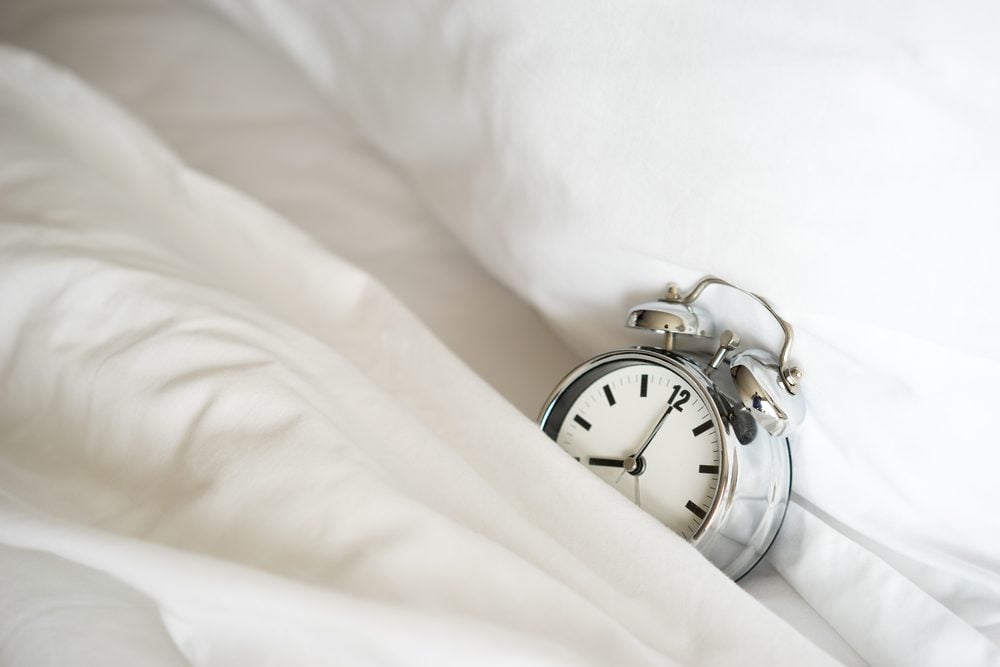
Go to bed early and be consistent
There’s mounting evidence that our body’s natural internal clocks, or circadian rhythms, drive a lot of our biological processes, including weight maintenance. They tend to sync up with daylight. That could be why studies have shown that shift workers tend to have a higher rate of obesity and weight gain—their body clocks are out of sync. One study even found that a third of people who experienced an interrupted sleep cycle for less than two weeks became pre-diabetic; all of the poor sleepers saw markers for the risk of obesity and type two diabetes climb. These strange things could be wrecking your sleep.
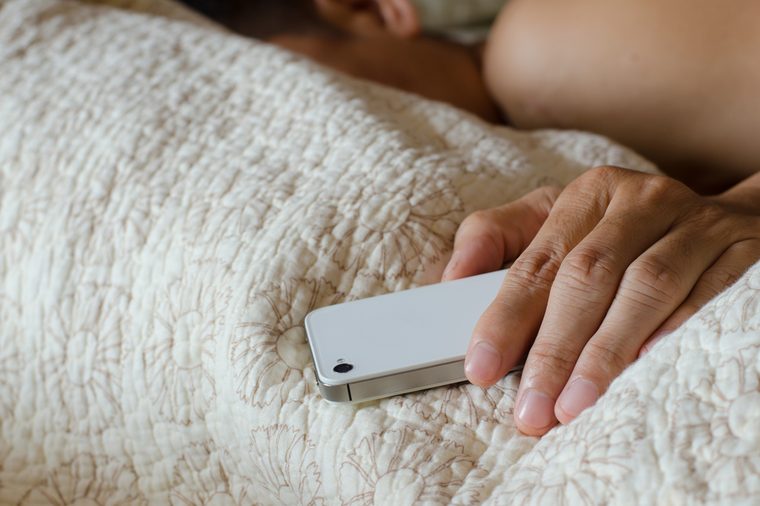
Power down devices
Another thing that messes with circadian rhythms? The blue light of digital devices. “We have seen increasing scientific evidence that the more you use devices, the higher your risk of obesity,” says Gillespie. The reason is twofold: One, the more time you spend in front of a screen, the less time you’re running around and playing. But also, experts believe, the blue light these devices emit can disrupt your internal clock. One study found that using a blue light-emitting device before bed delayed the release of melatonin, a hormone responsible for sleep, and the effect carried over to the following night as well. Here’s exactly what blue light is doing to your health.
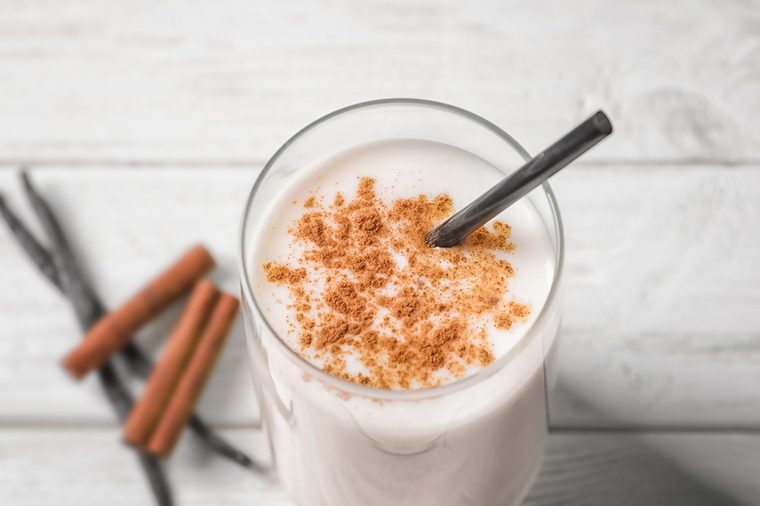
Don’t forget to fuel up
It’s a little counterintuitive, but consuming calories after you’ve just burned them appears to be vital to fat-burning. Your muscles need a combo of protein and carbs to replenish energy stores and build new muscle. In one study, people who downed a 270-calorie shake with 24 grams of protein and 36 grams of carbs after their workout lost about four more pounds of fat and built more lean muscle than those who didn’t refuel post-exercise. Eating protein after a workout may help with lean muscle gains and could also help to prevent overeating later in the day, says Lesli Bonci, RD, a nutritionist and owner of Active Eating Advice. Find out how this celeb trainer fuels her 6-day a week fitness routine.
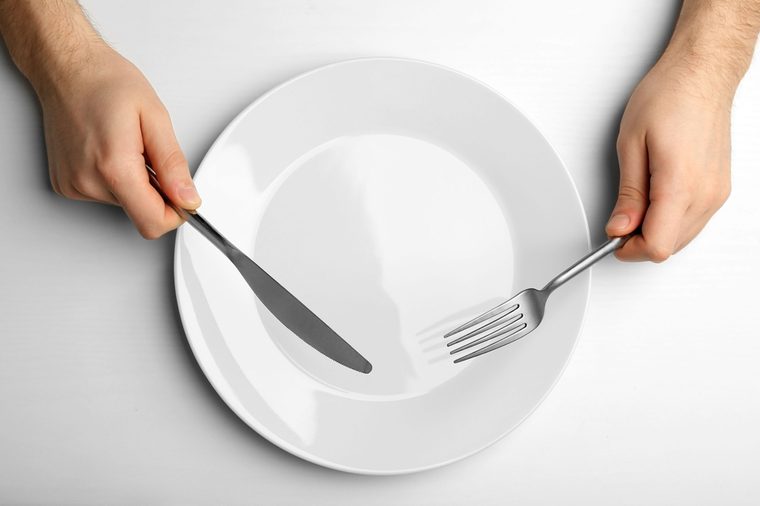
Eat enough
Creating a calorie deficit will help you lose weight. But if that deficit is too big—you’re eating too few calories—you could hurt your metabolism, says Bonci. Your body will go into starvation mode, conserving every calorie by slowing your metabolism and ramping up your appetite to try to force you to eat more. Read up on these 10 simple ways to eat less.

Don’t sit still
Moving isn’t just for the gym. Americans tend to sit too much in general. (This is what sitting is actually doing to your health.)You can combat that by engaging in “spontaneous physical activity”—fidgeting, tapping, and getting up from your desk or the couch frequently. Make moving a habit by standing when you take calls, for instance, using the stairs when possible, or bouncing your legs when you’re seated. Every calorie burned helps.
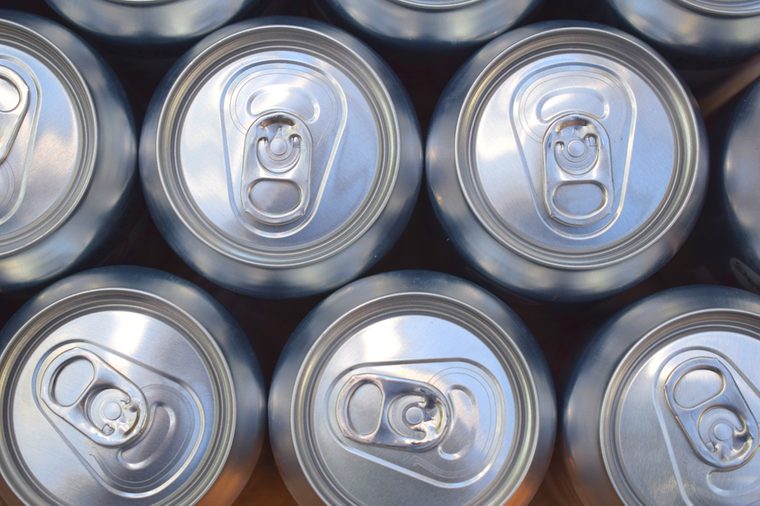
Avoid diet soda
Diet drinks can have a kind of mental placebo effect, making you feel like it’s OK to indulge because you “saved” all those liquid calories. And research shows that your body may be tricked too: People who chug one or more diet drinks a day are more likely to be overweight—not less. Can the soft drinks, whether the sugar in them is real or a substitute. Find out the real reason why you’ll never want to drink diet soda again.
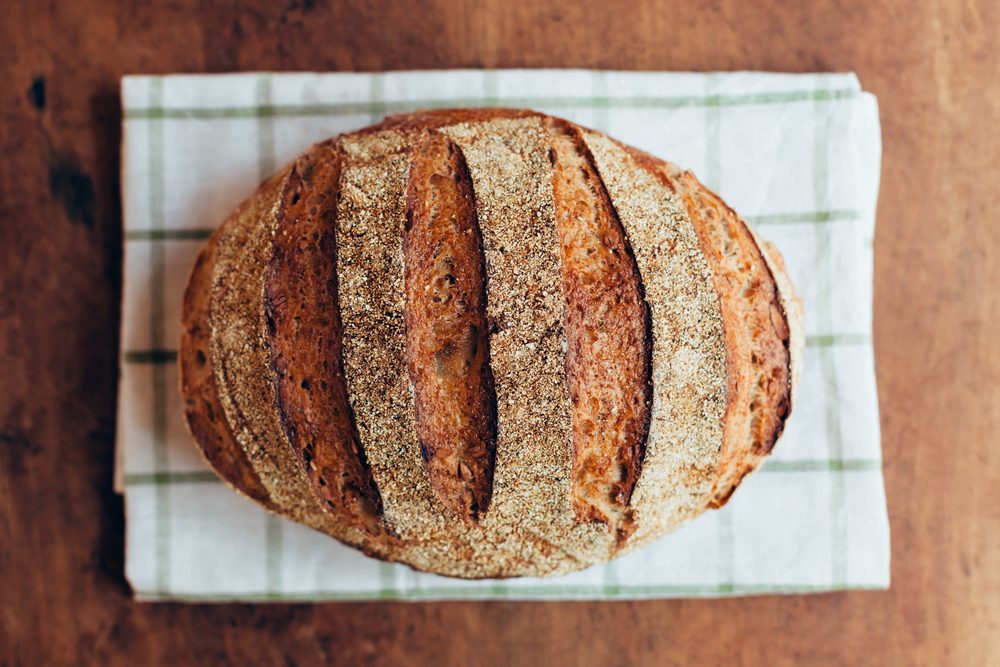
Swap refined grains for whole grains
You don’t have to nix all carbs, just make sure you’re eating the right ones. A recent study published in Plant Foods and Human Nutrition found that after 12 weeks, men who ate only whole grains lost about an inch and a half off of their belly, while those who ate only refined grains didn’t lose any. Toss the white bread and pasta and stock up on complex carbs instead. These are the silent signs your body needs more carbs.
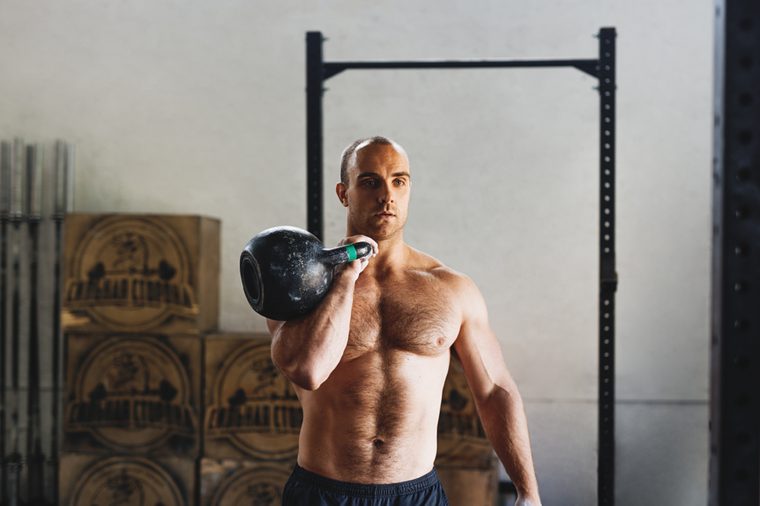
Be an early bird (at the gym)
Getting your workout in first thing can burn more fat than sweating it out later in the day. When you first wake up, carbohydrates, your body’s preferred energy choice, are in short supply, so your muscles are forced to burn fat for fuel, a process known as ketosis. For men, they’re an added boost because testosterone levels are highest in the a.m., allowing guys to push a little harder during their workouts. Here’s what you need to drink for breakfast to burn calories all day long.
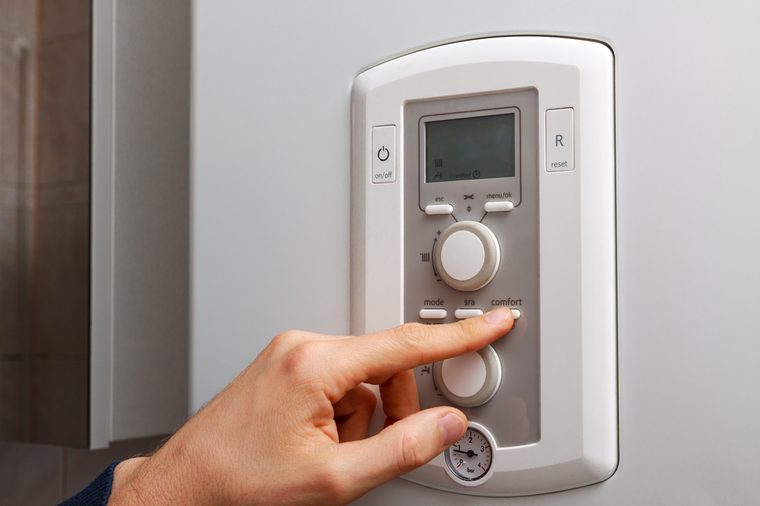
Chill out
Literally: According to a recent study published in the Nature journal Scientific Reports, cold temps may transform body fat from the typical white kind to brown fat, which actually helps you burn calories and burn fat fast. While more research needs to be done, taking your workout outside on a cold day or setting the thermostat slightly lower in the house could potentially help trigger the change at a cellular level.

Chill more
Figuratively, this time: Stress is a diet saboteur and it adds belly fat. University of Florida Health researchers have discovered that chronic stress stimulates the production of a protein called betatrophin, which interferes in normal fat metabolism. Meditate, get a massage, take a vacation—just find a way to ditch the stress and those pounds will melt away like your troubles. Here are 37 ways to ease stress today.
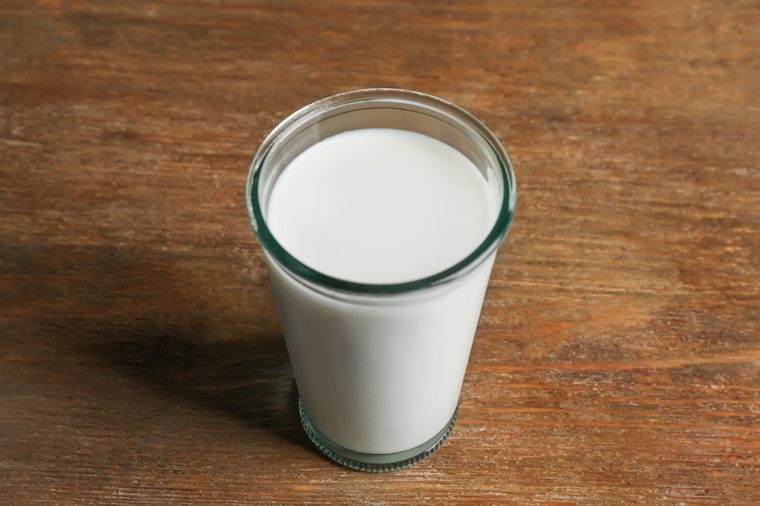
Drink dairy
People often cut out dairy when dieting, but cow’s milk has a lot of the nutrients that are essential to fat burning, including vitamin D and calcium. It’s also a great source of protein, which you need to build lean muscle, which is why experts say milk is a better post-workout drink than other beverages. Some research suggests that chugging moo juice after exercise results in more muscle gain and fat loss than drinking energy drinks. Read on to find out if dairy-free milk is damaging your brain.
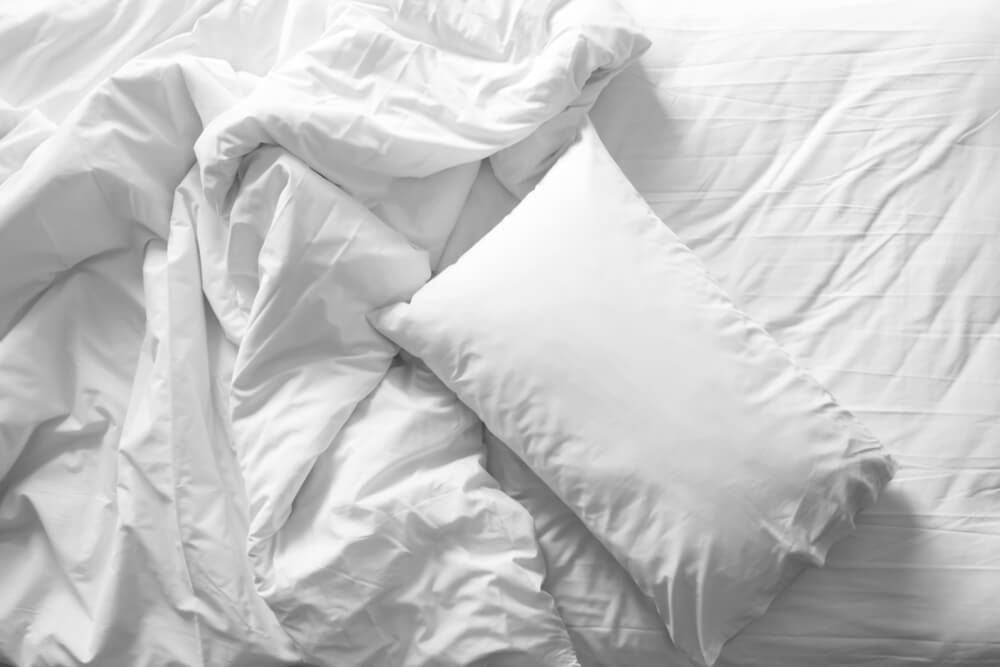
Get busy in the bedroom
Depending on how seriously you take the “active” part of “sexually active,” fun time in the bedroom can burn a decent amount of calories: Canadian researchers found it averaged 101 calories for men and 69 (hmmm) for women. Also, the hormone released when we have sex—oxytocin—may reduce appetite. Who says weight loss can’t be fun?
Here’s exactly how often your should have sex to reap its health benefits.
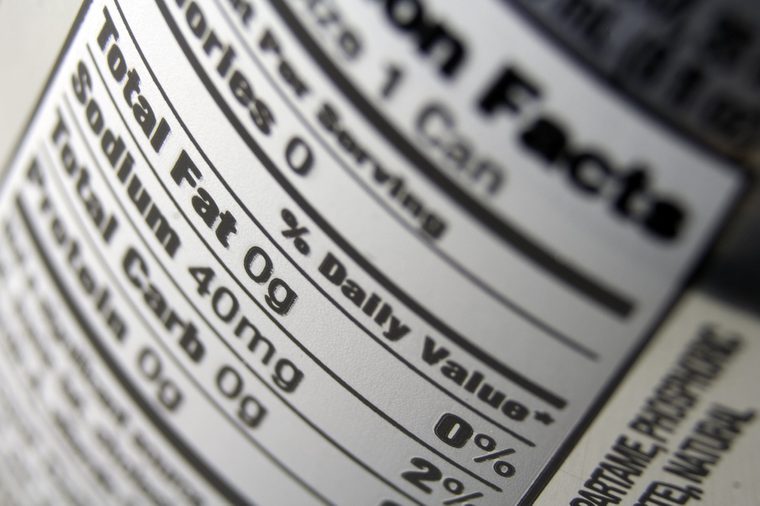
Read more
Especially at the grocery store. A study in the journal Agricultural Economics found that people who read nutritional labels tend to be about eight pounds thinner, on average, than those who don’t. There’s also evidence that when menus include calorie counts next to food items, people tend to consume fewer calories overall. Learn how to burn major fat with this hardstyle kettlebell workout.
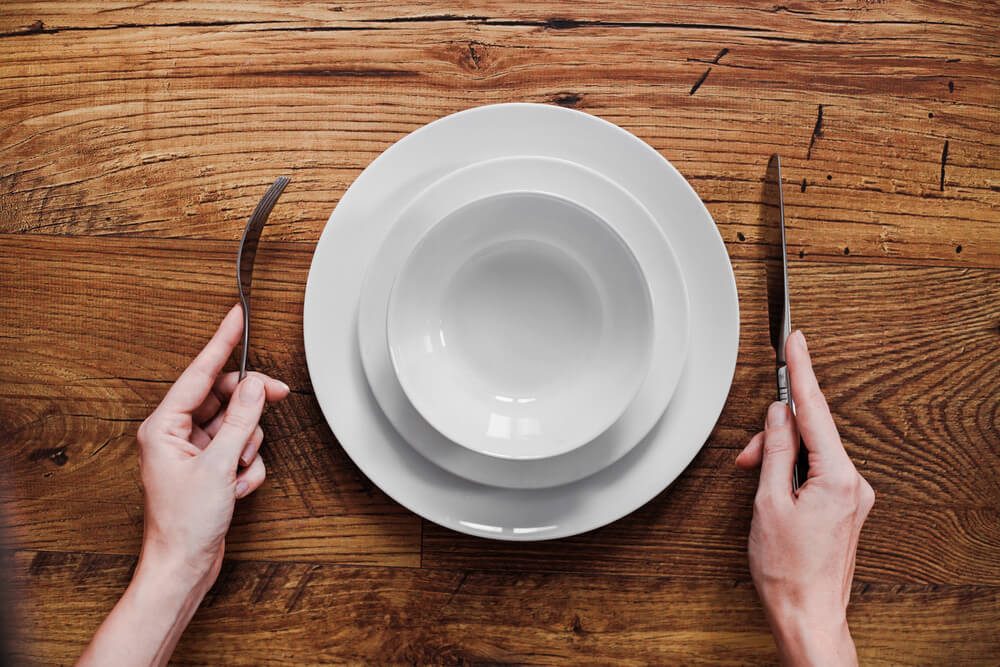
Fast, part-time
Intermittent fasting—limiting your eating hours to just eight, say between 10:30 and 6:30—has gained popularity as a way to shake up your metabolism, and it just might work. “There is a lot more research that needs to be done but it does seem to benefit some people, particularly men,” says Angel Planells, RD, a spokesperson for the Academy of Nutrition and Dietetics based in Seattle. Another approach is to fast—or eat next to no calories (500-600 calories total)—two non-consecutive days a week. (You can eat normally the other five days.) The tactic seems to increase fat burning. “When your body isn’t getting fuel, it will start burning fat,” Planells says.
Here’s every question you have about intermittent fasting—answered.
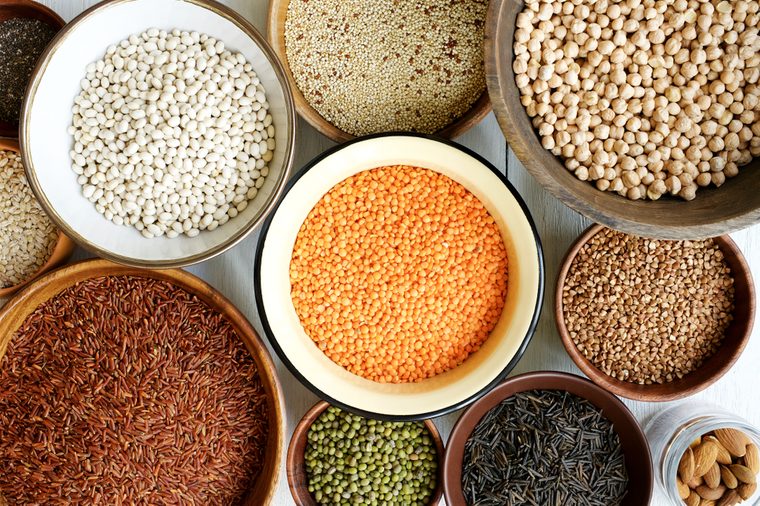
Eat more beans
Protein is a must for any weight loss plan, but it doesn’t always have to come from meat. Beans and legumes are a fantastic alternative because they tend to be lower in calories and fat, and high in filling fibre as well as protein. Swapping them in for meat has been shown to boost weight loss and can burn fat fast. Next, check out these 6 morning habits to help you lose weight.
